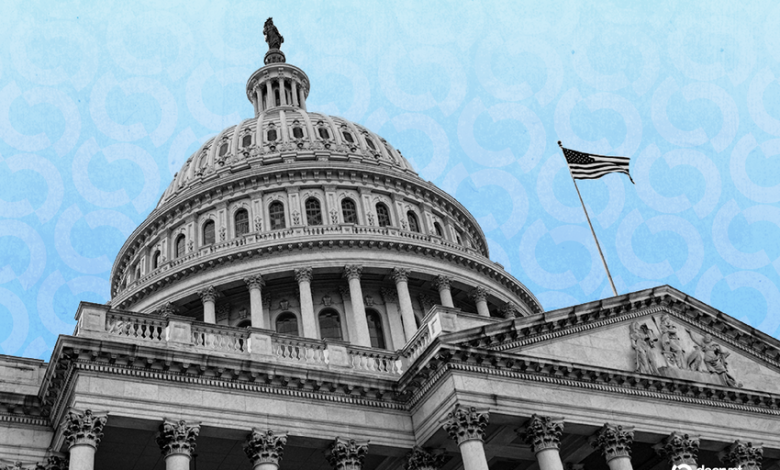Crypto Market Structure Bill Passes One House Committee, But Faces Steep Climb in Another

In brief
- The CLARITY Act passed the House Agriculture Committee Tuesday with a firmly bipartisan 47-6 vote.
- The crypto market structure bill faces a steeper climb on the House Financial Services Committee, which is still debating the legislation.
- Both committees, which jointly wrote the CLARITY Act, must pass the bill before it can be considered by the House.
The CLARITY Act successfully passed a vote by the House Agriculture Committee Tuesday—a widely expected outcome that still leaves plenty of hurdles for the crypto market structure legislation to overcome.
The bill, which would create a framework in the United States for issuing and trading most cryptocurrencies, passed the Ag Committee Tuesday morning in a decidedly bipartisan 47-6 committee vote. At the same time, down the hall, the CLARITY Act faced more intensive scrutiny from Democrats in a markup by the House Financial Services Committee.
The bill must pass markups by both committees—which jointly drafted it—before the legislation can proceed to consideration on the House floor.
Both committees independently marked up sections of the bill today pertaining to their respective purviews: commodities and the CFTC for Agriculture, and securities and the SEC for Financial Services. Those two marked up versions of the bill, if both are passed, will then be combined into one comprehensive bill and introduced on the floor, a Republican House staffer confirmed to Decrypt.
The CLARITY Act would see most crypto assets formally exempted from the SEC’s authority, and instead regulated by the more hands-off CFTC. Token issuers could opt to register with a more rigorous regime at the SEC if they sought certain perks, including the ability to sell directly to institutional investors. Some experts, cited by Democrats, have warned the bill could also have deregulatory ramifications beyond the crypto sector.
At the start of the Financial Services Committee’s markup Tuesday, Digital Assets Subcommittee chair Bryan Steil (R-WI) proudly hailed the news of the Ag Committee’s vote as soon as it was recorded.
“Moments ago, our colleagues on the Ag Committee passed the CLARITY Act 47-6, in an overwhelming bipartisan vote,” Steil announced to the room. “I feel optimistic that we can move forward on this legislation in a bipartisan manner.”
But the Financial Services Committee has proven to be a steeper climb than Agriculture for crypto legislation. When stablecoin legislation—which is widely considered an easier hurdle than market structure—passed the committee in April, 17 Democrats opposed the bill. That number could be even higher today.
What accounts for the difference? One crypto lobbyist told Decrypt it comes down to the difference in consensus over the respective roles of the CFTC and SEC in regulating crypto. There is “more consensus” that the CFTC should play a role in regulating crypto spot markets, and so the Agriculture Committee had less trouble passing the CLARITY Act, the lobbyist said.
“Some of the issues on the SEC side are more complicated,” they added, as an explanation of the hedging of Financial Services Committee Democrats.
Another crypto policy expert put it more bluntly. Ag Committee members are generally more concerned about attracting the ire of the crypto industry and its formidable political spending operation, they said. Members of the Financial Services Committee, meanwhile, routinely consider legislation pertaining to other well-heeled industries like Wall Street and banking, and so have more room to maneuver on crypto votes.
“If you piss off crypto, you can go to banks for money if you’re on Financial Services,” the policy expert said.
During Financial Services’ Tuesday markup of the CLARITY Act, Democrats forcefully pushed back against the bill’s passage, arguing it would enable President Donald Trump to continue to enrich himself on his and his family’s various crypto ventures, create a “super-highway to corruption”, and lead to the future implosion of companies, much like what happened with FTX.
Even pro-crypto Democrats like Rep. Sam Liccardo (D-CA) pushed back on central tenets of the CLARITY Act Tuesday. At one point during the markup, Liccardo questioned the bill’s exemption of decentralized finance protocols, otherwise known as DeFi, from regulation. The freshman congressman—who cosponsored the House’s stablecoin bill, but did not sponsor the CLARITY Act—expressed concern that projects could call themselves DeFi as a means to evade regulation, under the current bill. DeFi is shorthand for the collection of blockchain-based applications that allow crypto users to trade, borrow, and lend on-chain assets without the need for third-party intermediaries like banks and brokers.
“[What if] it walks like a duck, quacks like a duck, but we’re calling it DeFi?” he asked.
Financial Services Digital Assets Subcommittee chair Bryan Steil (R-WI) responded that the CLARITY Act, as written, examines a project’s “underlying function, rather than a label.” He said, for example, that only if a crypto trading platform was non-custodial—meaning it never takes full control of user funds—would it be exempt from the regulatory framework laid out in the bill. Billions of dollars worth of crypto are traded on such platforms every day.
Over the course of Tuesday’s markup, Democrats introduced numerous amendments to the CLARITY Act, including one that would prevent President Trump and his immediate family from engaging in crypto ventures while in office, and another that would explicitly prevent crypto token issuers from being bailed out with U.S. taxpayer funds. Both were voted down by the committee’s thin Republican majority.
Due to the number of amendments to the CLARITY Act Democrats plan to introduce—one Democratic staffer who spoke with Decrypt estimated the number could approach 40—the Financial Services Committee’s markup is expected to drag late into Tuesday evening. Only when all amendments on all bills before the committee have been considered will their passage be voted on, likely late tonight.
During Tuesday’s markup, Republicans admonished their Democratic colleagues, begging them not to derail the CLARITY Act’s chances of passage.
“Don’t put the brakes on a good bill that this country desperately needs,” Rep. Zach Nunn (R-IA) said.
At one point on Tuesday afternoon, once the markup reconvened after a break, Financial Services Chair French Hill (R-AR) addressed the negative characterizations of the bill put forth by Democrats. These attacks have increasingly focused on the bill’s lack of provisions preventing the president from engaging in crypto ventures while in office.
“This bill is not about the personal finances of any one individual,” Hill said. “It’s not an ethics bill.”
Daily Debrief Newsletter
Start every day with the top news stories right now, plus original features, a podcast, videos and more.




